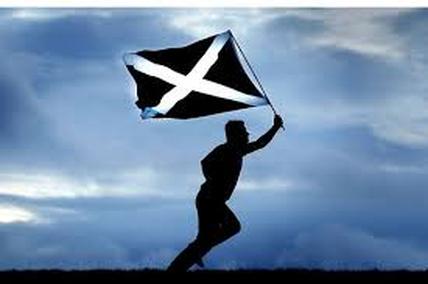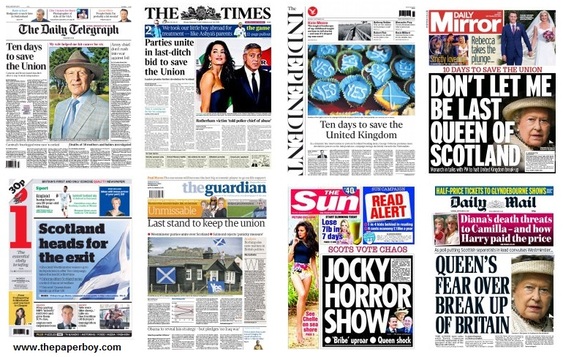For the past 18 months we have known that the people of Scotland would be deciding next week whether they want independence.
A Yes vote would not only be the beginning of the end of a 300-year-old union, but bring about changes reaching deep into all of our lives.
Yet for the whole of those 18 months, the English editions of our national newspapers have been far more concerned with a referendum that may or may not happen some time after the 2015 general election than with the one definitely taking place next Thursday. To be fair, so have our politicians.
When the campaigns got under way, it looked as though there would be a comfortable majority for the No camp. But this weekend a YouGov poll put the Yes camp in the lead for the first time and suddenly the news executives in London realised that this vote was not just Alex Salmond's little sideshow, but a real threat to the United Kingdom.
Politicians in England have been equally slow. The main parties are agreed that everyone would be better off if Scotland stayed put, perhaps with a few more sweeties as a consolation prize. When he was put in charge of the Better Together campaign, Darling was probably seen as a big hitter. Now he seems as mighty as Frank Dobson did when he was put in to bat against Ken Livingstone as a potential Mayor of London. And so all hopes are pinned on Gordon Brown, who still holds sway in his homeland.
There has been much discussion of heart v head in deciding which way to vote, but even so there has hardly been a proper recognition of human nature. Forget Brave Heart, it's not about that. But there is the appeal of being the little guy beating the big boy - and, for many, the chance to be rid of the Tories forever.
If you thought you had just one chance in your life to go it alone, would you cling to nanny's apron or would you take it? How many times have we been told that we will always regret the opportunity rejected more than we rue the chances we took that didn't turn out quite as hoped?
The alternative is too awful for the English newspapers to contemplate.
And so they haven't.
There was a flurry of stories last year about businesses' worries about the consequences of a Yes vote, but their warnings were seen as scaremongering (by the ayes) or as irrelevant (by the noes).
Why haven't the papers spelt out what is at stake - if not over the past 18 months, at least in the past few weeks?
- Where are the Q&A panels, the key issues graphics, the maps showing where the boundary would be drawn - not simply across Hadrian's Wall, but out into the sea?
- How would assets and debts be divided up? Would Scotland keep the oil and, if so, what would the impact be on the economy south of the border?
- Would financial institutions remain in Scotland or scuttle down south so that they could remain within the comforting arms of the Old Lady of Threadneedle Street?
- How has the franchise been worked out? Who is entitled to vote? What is the size and demographic of the electorate?
- What happens after the vote? What timeframe would we be facing in the event of a Yes majority?
- Who would negotiate the details?
- What would happen to the Union Flag?
- How would an independent Scotland compare with other small states in terms of resources?
- How have other breakaway nations coped since winning the right to go their own way: Eritrea, East Timor, South Sudan, the former Yugoslavian countries? What lessons might Scotland learn? What pitfalls might catch them out?
The answers to many of these questions are available on newspapers' websites, but few have found their way into print south of Berwick.
Why? Because people living in England, Wales and Northern Ireland - including Scots - have no say in the matter?
We have no say in the way Russia treats Ukraine, but that doesn't stop it, rightly, being front-page news.
Because it won't affect us? But it surely will. Remove oil revenues from our economy and suddenly the trade gap widens, that means more austerity. Remove the Scottish MPs from Westminster and the Conservatives are virtually guaranteed perpetual power.
And most important of all, what happens with next year's general election. If Scotland has voted Yes, how can it be allowed to have MPs deciding on issues relating to a foreign country? Indeed, what if it delivered enough Labour MPs to give Miliband a majority in Westminster?
This is surely the West Lothian Question Max.
Over the past few weeks, the heavies have made an effort with inside pages and spreads on the campaign, the tabs have pricked up their ears when David Bowie or Paul McCartney pipes up, but until this weekend no one regarded it as front-page news.
On Sunday, the referendum was the splash in the Sunday Times, Observer, Independent on Sunday and Mail on Sunday. This morning every paper, with the exception of the Express and Star, led on the threat to the union and Her Majesty's fear that she might be the last Queen of Scotland.
Today we learn that she has other things on her mind as well, and the news of her latest great-grandchild-to-be may deflect the papers' attention from Scotland. To be honest, it doesn't take much.
Apart from the twelve referendum splashes of the past two days, the subject has made a front-page lead on only five occasions this year:
Of course the Scottish editions of all the papers have been full of the independence campaign. But that is not enough.





 RSS Feed
RSS Feed


